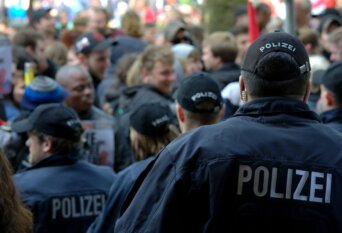- About
- Topics
- Story
- In-Depth
- Picks
- Opinion
- News
- Donate
- Signup for our newsletterOur Editors' Best Picks.Send
Read, Debate: Engage.
| topic: | Rule of Law |
|---|---|
| located: | Germany, United Kingdom |
| editor: | Gurmeet Singh |
As war broke out across Europe, Britain’s political composition was highly precarious. Where much of the nation was unified against Nazi Germany, there were significant anti-democratic and fascist groups gaining support. The most prominent of these was Oswald Mosley’s British Union of Fascists. Mosley was considered a powerful orator, and had significant support from parts of the British press, including the Daily Mail. In early 1940, Mosley was detained and interned, but was never charged with a crime. The reasoning behind his internment was clear: if Britain was going to fight fascists abroad, it was not going to tolerate growing fascist support at home.
The Coronavirus pandemic is not the Second World War, and conspiracy theorists against social-distancing are not (necessarily) fascists. However, there is a parallel to be drawn. In extraordinary circumstances, what happens to ordinary rights, including the rights of extreme groups? Berlin has forbidden “large gatherings” including protests. The groups particularly affected by the decision those who call themselves “querdenker”, or ‘lateral-thinkers’; people who do not accept the science behind the Coronavirus, or the institutional enforcement of social-distancing and lockdowns against the virus, as well as a mish-mash of anti-establishment, fascist groups.
“The interior minister for the city-state of Berlin, Andreas Geisel, said the ban was prompted by coronavirus skeptics "deliberately" breaking hygiene safety rules agreed with police during a previous mass Berlin event on August 1. Many attendants did not wear face masks or seek to uphold social distancing measures as requested.
Berlin would not allow itself to be misused for a second time as a backdrop for "coronavirus deniers, Reichsbürger and right-wing extremists," said Geisel, referring to a movement that denies Germany's post-war democratic existence.”
Geisel added: “it’s not a decision against freedom of assembly, rather it’s a form of protection against infection”. Legal challenges will be raised: “The lead organiser for next Saturday's rally, Stuttgart-based businessman Michael Ballweg, said on social media that he would challenge the decision in court, declaring: "we assume the assembly will take place on August 29."
It fits a national plan to ban large gatherings, including football matches. “Under the new rules, German football fans will not be allowed back into stadiums until 2021, later than had been hoped. Regulations on mask-wearing will also be toughened. Mass gatherings including festivals, concerts and big sporting events will remain prohibited”, writes The Guardian.
Personally, I welcome the decision to ban the gatherings; the need to protect people against the virus outweighs the need to protest against it. I am also pleased that the ban will hinder the gathering of far-right groups who opportunistically use the protests as a recruiting ground for their politics. However, I am aware that this decision is not unproblematic, and it may indeed be a serious breach against freedom of assembly, contrary to what Geisel says.
Laws and decisions cut both ways. We ban large gatherings of Corona-sceptics today, and feel justified in doing so. However, what if large gatherings against institutional racism are banned tomorrow? What precedents will this ban set?
Karl Popper famously argued that democratic societies should be tolerant, but have limits; they should tolerate everything except that which fundamentally undermined them, such as fascism. On the other hand, if Mosley could be interned, so could pacifists, conscientious objectors; anyone who did not toe the line. As Robert Bolt’s play “A Man For All Seasons” makes plain: in a perfect world, laws or their absence affect people equally. We cannot be indifferent to such measures, even when they target people with whom we don’t agree.
Image by fsHH

